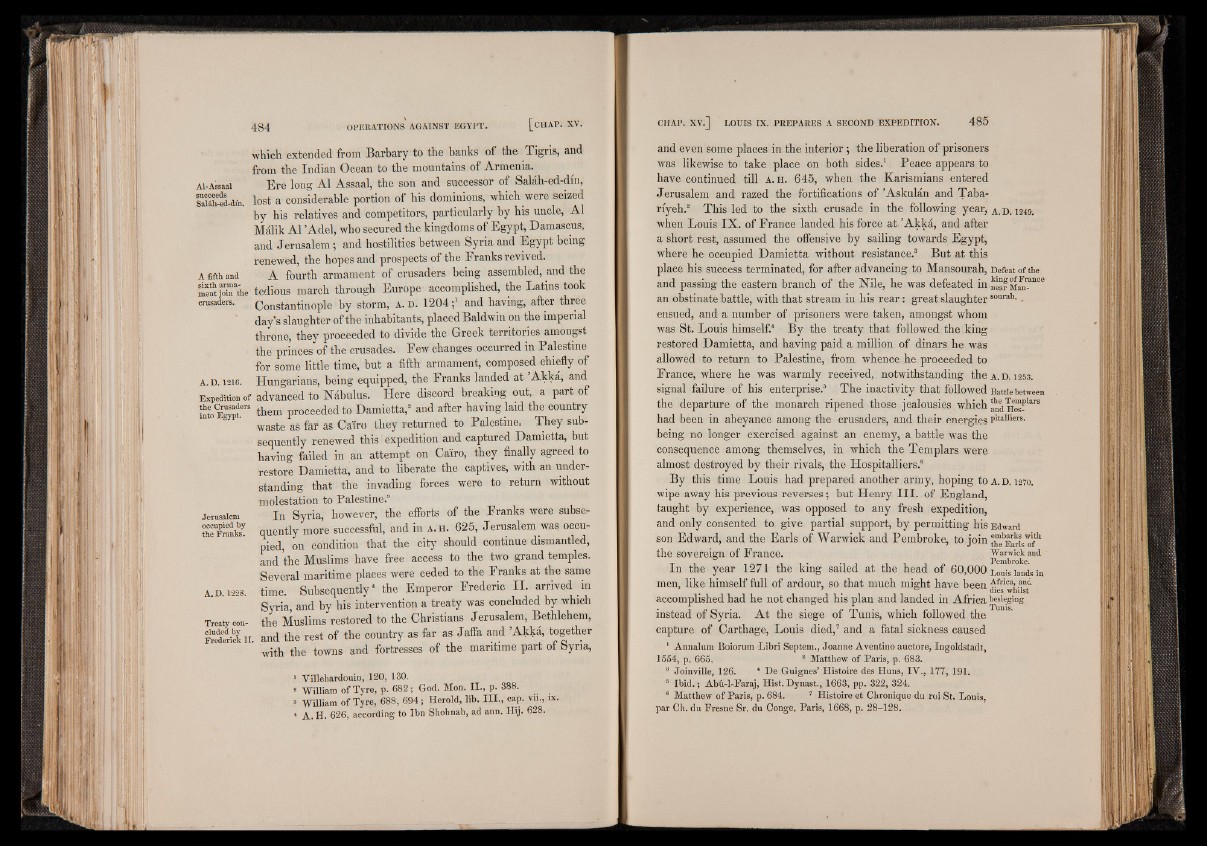
which extended from Barbary to the banks of the Tigris, and
from the Indian Ocean to the mountains of Armenia.
Ai-Assaai Ere long A1 Assaal, the son and successor of Salah-ed-din,
S a S h - e L m . lost a considerable portion of his dominions, which were seized
by his relatives and competitors, particularly by his uncle, A1
Malik A1 ’Adel, who secured the kingdoms of Egypt, Damascus,
and Jerusalem; and hostilities between Syria and Egypt being
renewed, the hopes and prospects of the Franks revived.
A fifth and A fourth armament of crusaders being assembled, and the
O l i f e tedious march through Europe accomplished, the Latins took
crusaders. Constantinople by storm, a.d. 1204-,1 and having, after three
day’s slaughter of the inhabitants, placed Baldwin on the imperial
throne, they proceeded to divide the Greek territories amongst
the princes of the crusades. Few changes occurred in Palestine
for some little time, but a fifth armament, composed chiefly of
a.d. 1216. Hungarians, being equipped, the Franks landed at ’Akka, and
E x p e d i t i o n o f advanced to Nabulus. Here discord breaking out, a part of
inn.ECTPtrS them proceeded to Damietta,2 and after having laid the country
waste as far as Cairo they returned to Palestine. They sub-
sequently renewed this expedition and captured Damietta, but
having failed in an attempt on Cairo, they finally agreed to
restore Damietta, and to liberate the captives, with an understanding
that the invading forces were to return without
molestation to Palestine.3
Jerusalem In Syria, however, the efforts of the Franks were subse-
quently more successful, and in a.h. 625, Jerusalem was occupied,
on condition that the city should continue dismantled,
and the Muslims have free access to the two grand temples.
Several maritime places were ceded to the Franks at the same
A.D. 1228. time. Subsequently4 the Emperor Frederic II. arrived in
Syria, and by his intervention a treaty was concluded by which
Treaty con- the Muslims restored to the Christians Jerusalem, Bethlehem,
Frederick ii. and the rest of the country as far as Jaffa and ’Akka, together
with the towns and fortresses of the maritime part of Syria,
1 Villehardouin, 120, 130.
2 William of Tyre, p. 682; God, Mon. I I ., p. 388.
a William of Tyre, 688, 694; Herold, lib. I I I ., cap. vii., ix.
4 A. H . 626, according to Ibn Shohnah, ad ann. Hij. 628.
and even some places in the interior; the liberation of prisoners
was likewise to take place on both sides.1 Peace appears to
have continued till a . h . 645, when the Karismians entered
Jerusalem and razed the fortifications of ’Askulan and Taba-
riyeh.2 This led to the sixth crusade in the following year, a. d . 1249.
when Louis IX. of France landed his force ah’Akka, and after
a short rest, assumed the offensive by sailing towards Egypt,
where he occupied Damietta without resistance.3 But at this
place his success terminated, for after advancing to Mansourah, Defeat of the
and passing the eastern branch of the Nile, he was defeated in ^ a ? Man™”06
an obstinate battle, with that stream in his rear: great slaughtersourah- -
ensued, and a number of prisoners were taken, amongst whom
was St. Louis himself.4 By the treaty that followed the king
restored Damietta, and having paid a million of dinars he was
allowed to return to Palestine, from whence he proceeded to
France, where he was warmly received, notwithstanding the a . d . 1253.
signal failure of his enterprise.5 The inactivity that followed Battle between
the departure of the monarch ripened those jealousies which
had been in abeyance among the crusaders, and their energies Pitalliers-
being no longer exercised against an enemy, a battle was the
consequence among themselves, in which the Templars were
almost destroyed by their rivals, the Hospitalliers.6
By this time Louis had prepared another army, hoping to a . d . 1270.
wipe away his previous reverses; but Henry III. of England,
taught by experience, was opposed to any fresh expedition,
and only consented to give partial support, by permitting his Edward
son Edward, and the Earls of Warwick and Pembroke, to join ^ E a r h ^ " *
the sovereign of France. Warwick and
In the year 1271 the king sailed at the head of 60,000 Loa;s jands in
men, like himself full of ardour, so that much might have been Arica; .anc- . 0 dies, whilst
accomplished had he not changed his plan and landed in Africa besieging
instead of Syria. At the siege of Tunis, which followed the
capture of Carthage, Louis died,7 and a fatal sickness caused
1 Annalum Boiorum Libri Septem., Joanne Aventino auctore, Ingoldstadt,
1554, p. 665, 8 Matthew of Paris, p. 683.
3 Joinville, 126. 4 De Guignes’ Histoire des Huns, IV ., 177, 191.
5 Ib id .; Abu-l-Faraj, Hist. Dynast., 1663, pp. 322, 324.
6 Matthew of Paris, p. 684. 7 Histoire et Chronique du roi St. Louis,
par Ch. du Presne Sr. du Conge, Paris, 1668, p. 28-128.